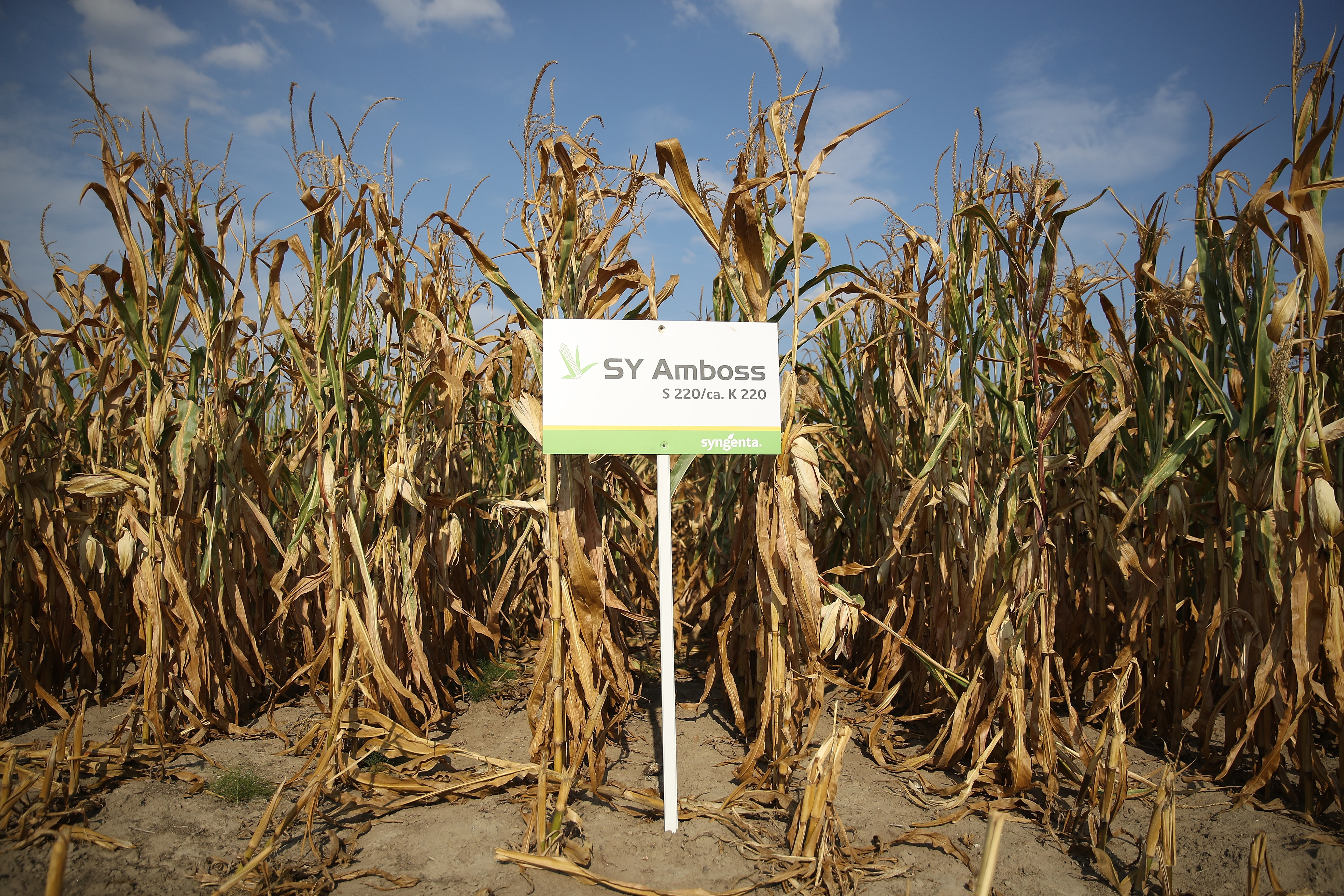
Mother Jones illustration; Evan Vucci/AP; Sean Gallup/Getty
In November 2020, President Donald Trump, citing national security risks, barred Americans from investing in firms designated as having ties to China’s military. Barely four years later, Trump’s 2025 inaugural committee accepted $250,000 from an American subsidiary of one of those companies.
Syngenta—an agribusiness giant that produces seeds, pesticides, and other farming technology—donated to the inaugural effort on December 31, joining a long list of businesses taking part in a display of corporate fealty widely criticized as an effort to buy goodwill from the new administration. Syngenta’s donation was disclosed in a lobbying filing the company made last week.
Unlike high-profile Trump inaugural donors such as Meta and Amazon, Syngenta is foreign-owned. It is a US-based subsidiary of a Swiss multinational that is ultimately controlled by the Chinese government. Syngenta was purchased in 2017 by China National Chemical Corporation, or ChemChina, which merged in 2021 with Sinochem, a company headquartered in Bejing that describes itself as a Chinese “state-owned” enterprise.
The first Trump administration allowed Syngenta’s sale to ChemChina. But in late 2020, amid a mounting trade war and recriminations over the spread of Covid, Trump issued an executive order barring Americans from investing in ChemChina and 30 other Chinese firms. The order followed a Defense Department finding that the companies support China’s military and intelligence activities.
The Pentagon issued an updated version of that list on January 7, including ChemChina as one of dozens of what it labels as “Chinese Military Companies Operating in the United States.”
Federal laws bar foreign people and corporations whose “principal place of business [is] in a foreign country” from donating to presidential inaugural committees and other other political committees. That law does not appear to prohibit the Syngenta Corporation—which is incorporated in Delaware as a US subsidiary of a global company—from donating. But accepting the funds from a Chinese-owned outfit arguably undermines the “America First” president’s confrontational rhetoric about China as he threatens a renewed trade war and escalated military competition with Beijing.
A spokesperson for the Trump inaugural committee did not respond to questions about the donation, including whether the committee knew of the Syngenta’s Chinese ownership.
But connection is not hard to make.

In 2023, former Trump press secretary and current Arkansas Gov. Sarah Huckabee Sanders drew headlines when she launched an attack on Syngenta over its Chinese ties. Sanders, who supported Trump’s 2024 bid—and at the time was working to sidestep controversy over a $19,000 lectern she’d purchased with state funds—ordered Syngenta to sell 160 acres of land it owned in the state. She also fined the company $280,000 for failing to timely report foreign ownership.
“This is about where your loyalties lie,” Sanders said at the time. “We simply cannot trust those who pledge allegiance to a hostile foreign power.”
Republicans in the Washington have expressed similar concerns. In 2021, 16 GOP members of the House Foreign Affairs Committee said Syngenta’s Chinese ownership raised concerns due to China’s “long history of engaging in economic espionage and agriculture-related intellectual property theft.” (A committee spokesperson didn’t respond Monday an inquiry about the company’s inaugural donation.)
“ChemChina’s acquisition of Syngenta has raised valid questions as to how Beijing…will then treat U.S. farm products,” Sen. Marco Rubio (R-Fla.), now Trump’s secretary of State, said in 2016.
(Another ChemChina-owned company, solar energy firm REC Americas, in 2018 hired the firm Ballard Partners—which at the time employed now-White House Chief of Staff Susie Wiles—to lobby the Trump administration, unsuccessfully, for an exemption from tariffs that Trump imposed on solar panels. Ballard’s lobbying disclosers did not initially disclose REC’s Chinese ownership, but after an inquiry by Mother Jones, the firm filed paperwork noting that the “People’s Republic of China” was among foreign entities with an interest in the lobbying work.)
A spokesperson for Syngenta said on Tuesday that the US-based company is “independent” and that its donation to the inaugural committee had no link to China.
“We are not a Chinese military company, nor do we have any association with the Chinese military,” the spokesperson said. “This is a corporate contribution from Syngenta Corporation.”
The company, however, has plenty of domestic reasons for seeking goodwill from Trump. Syngenta faces a lawsuit filed by the Federal Trade Commission and 10 states accusing it and another pesticide maker, Corteva, of artificially jacking up prices on farmers by improperly blocking competition from firms selling generic alternatives to its products. Sygnenta also appears to be one of the four major companies most likely to be hurt by a Biden administration initiative to curb the effects of consolidation in the seed industry. It’s not clear yet if the Agriculture Department will continue that policy under Trump.
Syngenta’s donation to the Trump inaugural committee follows substantial donations by the company’s corporate PAC to US lawmakers. In the 2024 election cycle, it donated $405,000, about 80 percent of which went to Republican candidates. The company spent about $380,000 lobbying in Washington last year, most of it in the early fall.
“We congratulate President Trump and the new administration and look forward to working with it to advance American agriculture,” Syngenta’s spokesperson said in a statement to Mother Jones. “Like many other companies, Syngenta Corporation has a history of engaging in public policy discussions, working with both sides of the aisle, and supporting candidates to advance the priorities of American farmers, particularly on issues aligned with our core values.”
Trump’s 2017 inaugural committee faced a federal criminal investigation into its fundraising, with prosecutors examining whether the committee accepted foreign money funneled through American donors. Though prosecutors never alleged that inaugural officials knowingly took illegal donations, a few inaugural donors were eventually convicted of secretly steering money linked to Emirati and Ukrainian officials to the inaugural effort.
It is not clear what steps, if any, the 2025 Trump inaugural committee—which greatly outraised the 2017 version—may have taken to prevent foreign interests from again helping to bankroll the inauguration.
